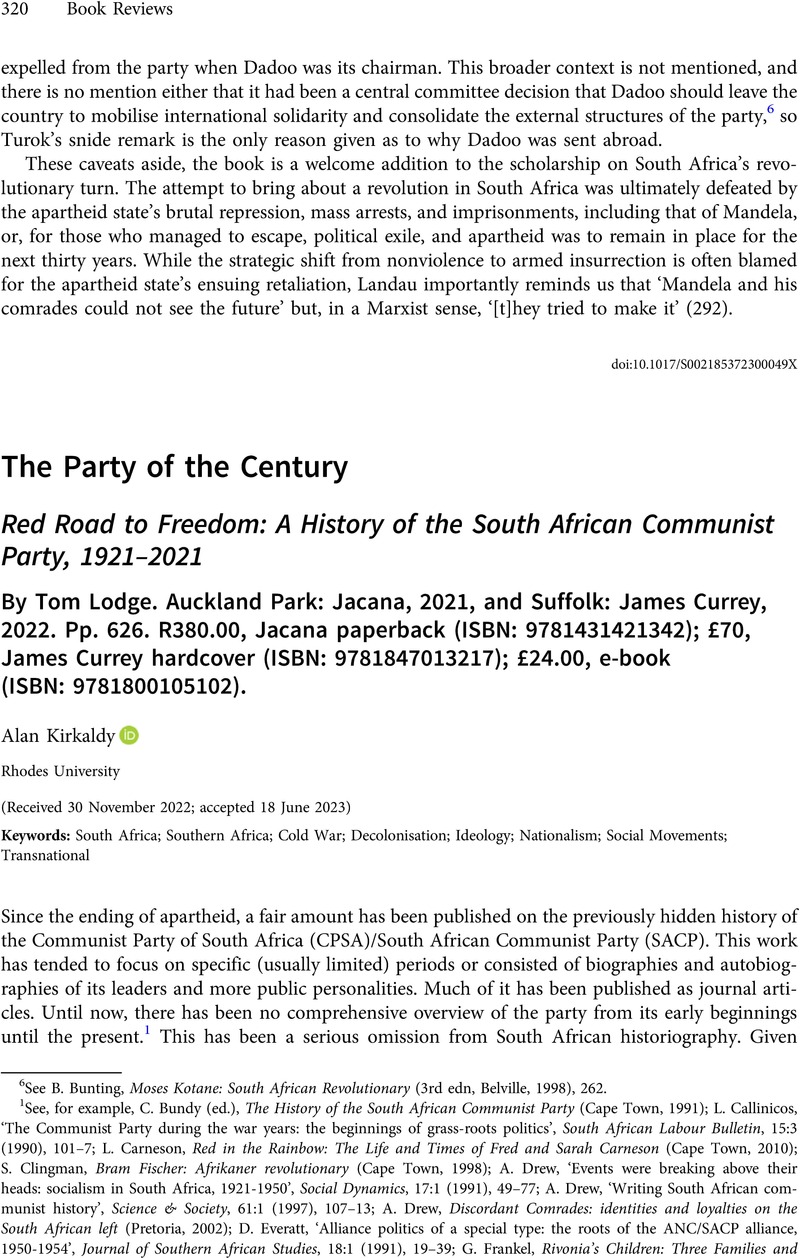No CrossRef data available.
Published online by Cambridge University Press: 18 July 2023

1 See, for example, Bundy, C. (ed.), The History of the South African Communist Party (Cape Town, 1991)Google Scholar; Callinicos, L., ‘The Communist Party during the war years: the beginnings of grass-roots politics’, South African Labour Bulletin, 15:3 (1990), 101–7Google Scholar; Carneson, L., Red in the Rainbow: The Life and Times of Fred and Sarah Carneson (Cape Town, 2010)Google Scholar; Clingman, S., Bram Fischer: Afrikaner revolutionary (Cape Town, 1998)Google Scholar; Drew, A., ‘Events were breaking above their heads: socialism in South Africa, 1921-1950’, Social Dynamics, 17:1 (1991), 49–77CrossRefGoogle Scholar; Drew, A., ‘Writing South African communist history’, Science & Society, 61:1 (1997), 107–13Google Scholar; Drew, A., Discordant Comrades: identities and loyalties on the South African left (Pretoria, 2002)Google Scholar; Everatt, D., ‘Alliance politics of a special type: the roots of the ANC/SACP alliance, 1950-1954’, Journal of Southern African Studies, 18:1 (1991), 19–39CrossRefGoogle Scholar; Frankel, G., Rivonia's Children: Three Families and the Price of Freedom in South Africa (Johannesburg, 1999)Google Scholar; Hepple, B., Young Man with a Red Tie, A Memoir of Mandela and the Failed Revolution (Sunnyside, 2013)Google Scholar; Hirson, B., Revolutions in My Life (Johannesburg, 1995)Google Scholar [Hirson was a Trotskyite]; Hodgson, R., Foot Soldier for Freedom: A life in South Africa's liberation movement (Johannesburg, 2010)Google Scholar; Johanningsmeier, E., ‘Communists and Black freedom movements in South Africa and the US: 1919-1950’, Journal of Southern African Studies, 30: 1 (2004), 150–80CrossRefGoogle Scholar; Kasrils, R., ‘Armed and Dangerous’: My Undercover Struggle Against Apartheid (Oxford, 1993)Google Scholar; A. Lerumo [M. Harmel], Fifty Fighting Years: The Communist Party of South Africa 1921-1970 (London, 1971); N. Levy, ‘The final prize: my life in the anti-apartheid struggle’, South African History Online, http://www.sahistory.org.za/archive/final-prize-norman-levy, accessed 15 Apr. 2016; Lodge, T., ‘Secret party: South African Communists between 1950 and 1960’, South African Historical Journal, 67:4 (2015), 433–64CrossRefGoogle Scholar; Roth, M., ‘Eddie, Brian, Jack and let's phone Rusty: is this the history of the Communist Party of South Africa (1921-1950)?’, South African Historical Journal, 42 (2000), 191–209CrossRefGoogle Scholar; SACP, The Red Flag in South Africa: A Popular History of The South African Communist Party 1921-1990 (Johannesburg, 1990); R. Seedat and R. Saleh (eds.), Men of dynamite: Pen Portraits of MK Pioneers (Lenasia, 2009); Slovo, J., Slovo: The Unfinished Autobiography (London, 1996)Google Scholar; Turok, B., Nothing but the Truth: behind the ANC's struggle politics (Cape Town and Johannesburg, 2003)Google Scholar; Wieder, A., Ruth First and Joe Slovo in the War Against Apartheid (New York, 2013)Google Scholar. For a comprehensive overview of the history of MK, see Simpson, T., Umkhonto we Sizwe: The ANC's Armed Struggle (Cape Town, 2016)Google Scholar. While I have focused on published sources here, special mention should be made of A. Lissoni, ‘The South African liberation movements in exile, c. 1945-1970’ (unpublished PhD thesis, University of London, 2008).
2 Lesley's name was officially Leslie. However, when writing my own work, she requested me to use the alternative spelling. I retain the practice here.
3 Both Ivan and Lesley would come to serve on the central committee of the party and both would choose to go to jail rather than flee the country, as they had been advised to do. As business manager of the Guardian newspaper (under its various name changes), as proprietor of Arnold's Christmas Hampers, and on numerous collecting trips with Rica Hodgson and others, Ivan headed the team which ensured that the CPSA remained afloat financially before its banning and exile. He also played an active role in caring for the welfare of party members. Lesley organised for the smuggling of comrades out of the country to avoid (re)arrest, worked with Violet Weinberg and others to hide Bram Fischer during his period as the Scarlet Pimpernel and took over Ivan's fundraising and disbursing functions after his arrest and imprisonment. Lodge acknowledges that internationalisation did not bring an influx of funds from the Soviet Union and other socialist countries and formations. This demonstrates the crucial role that people like Ivan and Lesley played. See Kirkaldy, A., Everyday Communists in South Africa's Liberation Struggle. The Lives of Ivan and Lesley Schermbrucker (Cham, 2002)Google Scholar.
4 T. Mohlala, ‘Jeremy Cronin – Communism is still relevant’, Mail & Guardian, 26 Apr. 2005, https://mg.co.za/article/2005-04-26-jeremy-cronin-communism-is-still-relevant/.
5 Cronin, J., ‘Review – Tom Lodge, Red Road to Freedom, A History of the South African Communist Party 1920-1921, Jacana, Johannesburg’, Journal of Asian and African Studies, 57:7 (2022), 1461–9CrossRefGoogle Scholar.